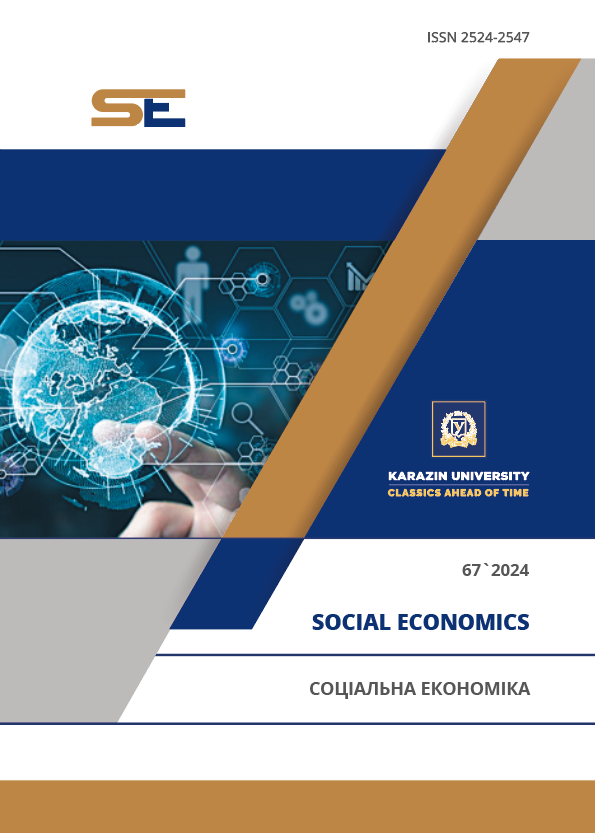SOME ASPECTS OF THE ANALYSIS OF CYCLICAL FLUCTUATIONS IN THE ECONOMY (IN THE CASE OF THE CORONAVIRUS PANDEMIC CRISIS)
Abstract
The global economy is characterized by cyclical fluctuations, often leading to periods of economic crises. The COVID-19 pandemic, which began in December 2019 in Wuhan, China, has caused a significant economic downturn, exacerbating pre-existing vulnerabilities and introducing new challenges. This paper delves into the intricate dynamics of these cyclical fluctuations, focusing on the recent pandemic crisis and its profound impacts on global economies. It examines the underlying causes and manifestations of economic crises, drawing on historical data and theoretical frameworks from renowned economists such as J.M. Keynes, G. Soros, and contemporary researchers.
The study employs a systematic methodology encompassing comparative analysis, statistical observation, and scientific abstraction to dissect the causes and effects of the pandemic-induced crisis. The research categorizes crisis causes into natural, fundamental, instrumental, and behavioral groups, attributing the COVID-19 crisis primarily to natural causes. The analysis reveals that, before the onset of the pandemic, the global economy was already teetering on the brink of a crisis due to factors such as sharp economic fluctuations, declining gross demand, rising external debt, and the intensification of trade wars.
The paper further explores the chronology of economic crises from the 19th century to the present, highlighting the recurrent nature of these downturns and their varied triggers. Historical crises such as the Great Depression, the 1997 Asian financial crisis, and the 2008 global financial crisis are analyzed to draw parallels and contrasts with the current situation. The study emphasizes the role of pre-crisis conditions and the exacerbating effects of the pandemic, noting that crises often result from a confluence of multiple stressors rather than a single cause.
Results from the analysis indicate that the economic policies implemented by major economies such as the United States, European countries, and China during the pandemic have had mixed outcomes. While measures like quantitative easing and fiscal stimuli have provided temporary relief, they have also led to significant imbalances, such as the ballooning of public debt and the overreliance on monetary policy tools. The study highlights the differential impact of the crisis on various sectors, with tourism, transportation, and energy investments being particularly hard-hit, while digital technologies and remote working solutions have seen accelerated growth.
The paper concludes with a set of policy recommendations aimed at mitigating the adverse effects of the pandemic and fostering economic recovery. Key suggestions include expanding digitization, maintaining strict public health measures, gradually resuming economic activities with appropriate safety protocols, and fostering international cooperation to ensure a coordinated response to the crisis. The study underscores the importance of learning from past crises and adapting policies to address the unique challenges posed by the COVID-19 pandemic, ultimately aiming for a more resilient and inclusive global economic recovery.
Downloads
References
Jabbarov, K. Y. (2017). Iqtisodiy inqiroz kategoriya sifatida [Crisis as an economic category]. Scientific electronic journal "Economics and innovation technologies", 6, 1-10. (in Uzbek)
Keynes, J. M. (1936). The theory of employment, interest and money. New York: Harcourt.
Chou Yuan, K. (2007). Modeling Financial Innovation and Economic Growth: Why the Financial Sector Matters to the Real Economy. Journal of Economic Education, 38(1), 78-91. doi: https://doi.org/10.3200/JECE.38.1.78-91
Soros, G. (2008). The New Paradigm for Financial Markets. The Credit Crisis of 2008 and What It Means. New York: Public Affairs.
Dumitru, M., Papari, A., & Seceleanu, A. (2019). The Effects of the Last Global Economic Crisis on Suicide Rate in Europe. International Review of Management and Business Research, 8(4), 370-380. doi: https://doi.org/10.30543/8-4(2019)-2
Tekin, H. (2020). How optimal cash changed by the global financial crisis? A multi-country analysis. Economics and Business Letters, 9(2), 114-123. doi: https://doi.org/10.17811/ebl.9.2.2020.114-123
Drago, D., & Gallo, R. (2020). The impact of financial crises on the syndicated loan spreads appliedto public and private firms. Journal of Financial Stability, 46, 100718, 1-12. doi: https://doi.org/10.1016/j.jfs.2019.100718
Zhu, X., Asimakopoulos, S., & Kim, J. (2020). Financial development and innovation-led growth: Is too much finance better? Journal of International Money and Finance, 100, 102083, 1-24. doi: https://doi.org/10.1016/j.jimonfin.2019.102083
Dungey, M., Islam, R., & Volkov, V. (2020). Crisis transmission: Visualizing vulnerability. Pacific-Basin Finance Journal, 59, 101255, 1-22. doi: https://doi.org/10.1016/j.pacfin.2019.101255
Karimova, D. (n.d.). Uzbekistan Builds a National Model for Poverty Reduction. Retrieved from https://uzembassy.uk/news/1040
UNCTAD. (2016). Trade and Development Report 2016. Structural Transformation for Inclusive and Sustained Growth. New York – Geneva. Retrieved from http://unctad.org/en/PublicationsLibrary/tdr2016_en.pdf
Varnavskii, G. V. (2019). Globalization and structural changes in the world economy. World Economy and International Relations, 63(1), 25-33. doi: https://doi.org/10.20542/0131-2227-2019-63-1-25-33
Rawlinson, K. (2020, April 1). Coronavirus latest: 31 March at a glance. The Guardian. Retrieved from https://www.theguardian.com/world/2020/apr/01/coronavirus-at-glance
The New York Times. (2020). Reuters global markets q1 graphic. Retrieved from https://www.nytimes.com/reuters/2020/03/31/business/31reuters-global-markets-q1-graphic.html
Dmitrieva, K. (2020). U.S. Jobless Claims in Millions Again, Connecticut Corrects Data. Retrieved from https://www.bloomberg.com/news/articles/2020-05-14/u-s-jobless-claims-remain-in-millions-for-eighth-straight-week
Bowman, V., Cameron-Chileshe, J., & Davies, G. (2020). South West’s R rate rises above one - but minister plays down alarm. Retrieved from https://www.telegraph.co.uk/global-health/science-and-disease/coronavirus-news-test-trace-uk-nhs-social-distancing-cases-deaths/
Wilson, A. (2020, May 7). World tourism faces worst crisis since records began, says UNWTO. The Guardian. Retrieved from https://www.theguardian.com/travel/2020/may/07/ world-tourism-faces-worst-crisis-since-records-began-says-unwto-report
Jamrisko, M., & Carson, R. (2020). Singapore Slumps Into Recession With Record 41.2% GDP Plunge. Retrieved from https://www.bloomberg.com/news/articles/2020-07-14/singapore-slumps-into-recession-with-41-2-fall-in-quarterly-gdp
Sullivan, H., Rawlinson, K., Murray, J., Gayle, D., & Burnton, S. (2020, June 11). Africa passes 200,000 confirmed cases after Burundi president dies of suspected Covid-19 – as it happened. The Guardian. Retrieved from https://www.theguardian.com/world/live/ 2020/jun/10/coronavirus-live-news-who-urges-pakistan-to-reimpose-lockdown-as-brazil-restores-covid-19-data
Baczynska, G. (2020). EU announces work scheme, aid for farmers, fishermen amid coronavirus pandemic. Retrieved from https://www.reuters.com/article/us-health-coronavirus-eu/eu-announces-work-scheme-aid-for-farmers-fishermen-amid-coronavirus-pandemic-idUSKBN21K1AB




